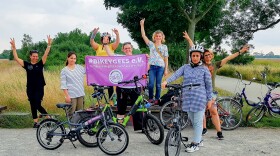
Deborah Amos
Deborah Amos covers the Middle East for NPR News. Her reports can be heard on NPR's award-winning Morning Edition, All Things Considered, and Weekend Edition.
In 2009, Amos won the Edward Weintal Prize for Diplomatic Reporting from Georgetown University and in 2010 was awarded the Edward R. Murrow Lifetime Achievement Award by Washington State University. Amos was part of a team of reporters who won a 2004 Alfred I. duPont-Columbia University Award for coverage of Iraq. A Nieman Fellow at Harvard University in 1991-1992, Amos returned to Harvard in 2010 as a Shorenstein Fellow at the Kennedy School.
In 2003, Amos returned to NPR after a decade in television news, including ABC's Nightline and World News Tonight, and the PBS programs NOW with Bill Moyers and Frontline.
When Amos first came to NPR in 1977, she worked first as a director and then a producer for Weekend All Things Considered until 1979. For the next six years, she worked on radio documentaries, which won her several significant honors. In 1982, Amos received the Prix Italia, the Ohio State Award, and a DuPont-Columbia Award for "Father Cares: The Last of Jonestown," and in 1984 she received a Robert F. Kennedy Journalism Award for "Refugees."
From 1985 until 1993, Amos spend most of her time at NPR reporting overseas, including as the London Bureau Chief and as an NPR foreign correspondent based in Amman, Jordan. During that time, Amos won several awards, including a duPont-Columbia Award and a Breakthru Award, and widespread recognition for her coverage of the Gulf War in 1991.
A member of the Council on Foreign Relations, Amos is also the author of Eclipse of the Sunnis: Power, Exile, and Upheaval in the Middle East (Public Affairs, 2010) and Lines in the Sand: Desert Storm and the Remaking of the Arab World (Simon and Schuster, 1992).
Amos is a Ferris Professor at Princeton, where she teaches journalism during the fall term.
Amos began her career after receiving a degree in broadcasting from the University of Florida at Gainesville.
-
A team at Yale University is using open-source materials to document the forced removal of Ukrainian children to Russia. Russia says it's a vast humanitarian program.
-
The world's first criminal trial on torture in Syria's prisons ended Thursday in Koblenz, Germany — the first time a high-ranking ex-Syrian official faced Syrians in open court in a war crimes case.
-
Kevin Dawes describes how a fellow prisoner in Syria kept a promise that called attention to Dawes' detention. Now, five years after his release, Dawes is suing the Syrian regime.
-
They come from countries where the idea of a girl on a bicycle is often taboo. Now a group called Bikeygees is teaching them to master the pedals. For the new riders, it's a lifelong dream come true.
-
The coronavirus crisis has left little to no time for important discussions with those in hospice care — about whether they want the treatment that could save them or wish to do without it.
-
For Dr. Antonio Dajer from New York, the coronavirus pandemic is not the first massive medical crisis spent in an emergency room. He was there for 9/11 and, before that, the AIDS epidemic.
-
Afghans who helped U.S. troops back home in Afghanistan have ended up in the New York area with their families, and they're helping fight the coronavirus.
-
The country's foreign minister called the move possibly the largest peacetime repatriation in Canadian history.
-
Canadian Prime Minister Justin Trudeau announced Friday that Canada will now turn back asylum seekers attempting to enter the country outside official border points.
-
Protest organizers, lawyers and rights advocates tell NPR the authorities have adopted surveillance tactics, including allegedly invading chat groups to intimidate and investigate critics.






